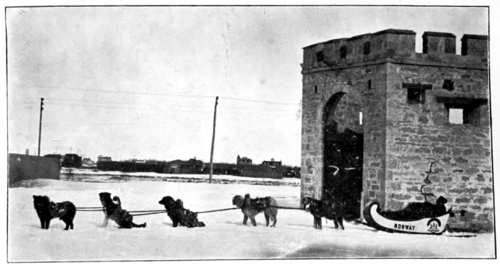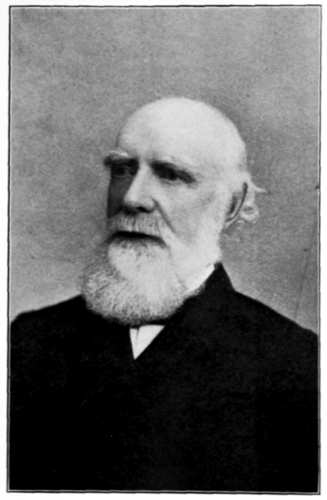|
On Christmas Day, 1870, John Bruce,
who was but a figurehead, resigned his office of President of the
so-called Provisional Government of Red River Settlement, and the
ambitious Louis Riel was chosen in his stead. The Dominion Government
had at length, been awakened to the danger. Divided counsels still
prevailed. Two Commissioners, Grand Vicar Thibault and Col. De Salaberry,
arrived at Fort Garry, but they were safely quartered at the Bishop's
palace at St. Boniface, and as they professed to have no authority, Riel
cavalierly set them aside. At this time the American element in the
hamlet of Winnipeg became very offensive. Riel's official organ, "The
New Nation," was edited by an American, Major Robinson. This journal was
filled with articles having such head-lines as "Confederation," "The
British-American Provinces," "Proposed Annexation to the United States,"
etc., etc. Or, again, "Annexation," "British Columbia Defying the
Dominion," "Annexation our Manifest
Destiny." All this was very disagreeable to the English-speaking people,
and highly compromising to Riel.
But the real negociator was at hand,
and he not only had the authority to speak for Canada, but had Scottish
prudence and diplomacy, as well as real influence in the country, from
holding the highest position in Canada of any of the officers of the
Hudson's Bay Company. This chief factor was Donald A. Smith, whom we
have since learned to know so well as Lord Strathcona. He, with his
secretary, Hardisty, arrived on December 27th, and went immediately to
Fort Garry. Riel demanded of Mr. Smith, the object of his visit, but
received no satisfaction. On being asked for his credentials, Mr. Smith
replied that he had left them at Pembina. Being a high Hudson's Bay
Company officer, he was quartered in Government House, Fort Garry. The
larger portion of the building was occupied by Governor McTavish, the
smaller or official portion became the Commissioner's apartments. Here
he was able to observe events, meet a number of the old settlers, and
obtain his information at first hand. On the 15th of January Riel again
demanded the Commissioner's papers; he, indeed, offered to send to
Pembina for them, but Mr. Smith declined the offer. In the meantime the
Commissioner had learned that the Dauphinais Settlement, lying
between Pembina and Fort Garry was loyal. Accordingly, with a guard,
Hardisty started to bring the papers. Riel learned of this, and taking a
body guard with him, went to the Dauphinais house, intending to seize
the credentials. Hardisty arrived with his precious documents.
Meanwhile, the Loyalists had made Riel's men prisoners, and when Riel
attempted to interfere, Pierre Laveiller, a loyal French half-breed, put
his loaded pistol to the Dictator's head, and threatened his life. Sixty
or seventy of the Loyalists escorted Hardisty and his papers to Mr.
Smith in Fort Garry.

Train of Huskie Dogs. Fort
Garry, north gate
Now in possession of his documents,
the Commissioner called a general meeting of the people for January
19th, and one thousand men appeared on that day in the Court Yard of the
Fort. As there was no building in which they could assemble, the meeting
was held in the open air, with the temperature 20° below zero. The
people stood for hours and listened to the proceedings. Commissioner
Smith then read the letter of his appointment, and also a letter from
the Governor-General, which announced to the people that the Imperial
Government would see that "perfect good faith would be kept with the
inhabitants of the Red River and the Northwest." The Commissioner then
demanded that Vicar Thibault's commission, which Riel had seized should
be read. Riel refused
it, but Mr. Smith stood firm. At length the Queen's message to the
people was proclaimed. One John Burke then demanded that the prisoners
be released and a promise was given. On the second day the people again
assembled, and Mr. Smith then read authoritative letters, one from the
Governor-General to Governor McTavish, and another to Mr. McDougall. It
was then moved by Riel, seconded by Mr. Bannatyre, and carried
unanimously, that twenty representatives should be elected by the
English Parishes and twenty by the French, and that these should meet on
January 25th to consider the subjects of Commissioner Smith's
communications, and decide what was best for the welfare of the country.
Speeches were made by the Bishop of Rupert's Land, and Father Richot and
Riel closed the meeting by saying: "I came here with fear ... we are not
enemies—but we came very near being so.... we all have rights. We claim
no half rights, mind you, but all the rights we are entitled to."
Begg, an eye-witness, says:
"Immediately after the meeting the utmost good feeling prevailed. French
and English shook hands, and for the first time in many months a spirit
of unity between the two classes of settlers appeared. The elections
took place in due time, but in Winnipeg Mr. Bannatyne, the best citizen
of the place, was beaten by Mr. A.H. Scott, and
the greatest annoyance was felt at this by the better citizens on
account of his being an American, and because of the 'New Nation'
continuing to advocate annexation."
On the 25th of January the forty delegates
assembled. Much excitement had been caused at this time among the French
by the escape of Dr. Schultz, their great opponent. Commissioner Smith
addressed the Convention. Riel wished him to accept the original Bill of
Rights, but Mr. Smith refused to do this. A proposal was then brought up
by the French Deputies that the proposal made by the Imperial Government
to the Hudson's Bay Company to take over their lands be null and void.
This was voted down by 22 to 17. Riel rose in rage and said: "The devil
take it; we must win. The vote may go as it likes, but the motion must
be carried." Riel raged like a madman. That night, in his fury, he went
to the bedside of Governor McTavish, sick as he was, and it is said,
threatened to have him shot at once. Dr. Cowan, the master of the fort,
was arrested, and so was Mr. Bannatyne, the chief merchant, as well as
Charles Nolan, a loyal French delegate.
On the 7th of February the delegates
again met, and at this meeting Commissioner Smith, having the power
given him by the Dominion Government, invited the Convention to send delegates
to Canada to meet the Government at Ottawa. Two English delegates,
Messrs. Sutherland and Fraser, not quite sure on this point, visited
Governor McTavish for his advise. "Form a Government, for God's sake,"
said the Governor, "and restore peace and order in the Settlement."
Being asked, if in such case, he would delegate his authority to anyone,
he hastily replied, "I am dying, I will not delegate my authority to
anyone."
The Convention then proceeded to elect a
provisional government. Most of the officers were English, they being
better educated and more prominent than the French members. But when it
came to the election of a President, to their disgust Riel was chosen.
Immediately after this, Governor McTavish, Dr. Cowan, and Mr. Bannatyne
were released as prisoners, but Commissioner Smith was a virtual
prisoner in his quarters in the fort, though his influence was still
felt at every turn.

LORD STRATHCONA AND MOUNT ROYAL.
Governor of the Hudson's Bay Company
Among the earliest acts of the new
provisional government was on February 11th, the confiscation of Dr.
Schultz's property, and of the office of The Norwester newspaper. The
type of The Norwester was said to have been melted into bar lead and
bullets. Judge Black, Father Richot, and A.H. Scott were chosen as
delegates to Ottawa, though the appointment of the last of these, the
"American delegate," was
very distasteful to the English-speaking people. The success of Riel led
him to dismiss about a quarter of the prisoners in Fort Garry. The fact
that he seemed to hold the remainder as hostages stirred up the English
people living along the Assiniboine.
What is usually called the "Portage
la Prairie" Expedition was now organized, to secure the release of the
remaining prisoners. A body, varying from sixty to one hundred, marched
down to Headingly, and were there joined by a number of English-speaking
Canadians and others. They then pushed on to Kildonan Church, where they
were increased by a number of English half-breeds from St. Andrew's and
adjoining parishes. The proposal was to attack the fort and set free the
prisoners. Alarmed at the movement, Riel released all the prisoners in
the fort. Their object being gained, the men of the Kildonan Church
camp, who had grown to be six hundred strong, dissolved, and were
proceeding to their homes, when Riel, by an unheard of act of treachery,
arrested some fifty of the Assiniboine party. Among them was Major
Boulton, a former officer of the 100th Regiment. Riel again sought out a
victim for revenge, and intended to execute this prominent man. It was
only on the persistent request of Commissioner Smith and the urgency of
Mrs. John Sutherland, whose son
had been killed by an escaping French prisoner at the Kildonan Church
camp, that Boulton's life was spared.
Riel, however, seemed to feel that power
was slipping from his hands. He was criticised on all hands for his
treachery and for his arrogance. It is said his followers were dropping
off from him, notwithstanding the luxurious lives they had been living
on the Company's supplies in Fort Garry.
He determined, though with a divided
Council, to make an example, and despite the solicitations of
Commissioner Smith, the Rev. George Young, and others, publicly
executed, on the 4th of March, outside of Fort Garry, a young
Irish-Canadian named Thomas Scott. It was a cold-blooded,
cruelly-executed and revolting scene—it was the act of a mad man.
"Whom the Gods destroy they first
make mad." The execution of Scott was the death-knell of Riel's hopes as
a ruler. Canada was roused to its centre. Determined to have no further
communication with Riel, and feeling that he had done all that he could
do, Commissioner Smith, on the 18th of March, returned to Canada. On the
8th of March, Bishop Tache returned from Rome. A few days after Chief
Factor Smith's departure, he was followed to Canada by Father Richot and
Mr. Scott, and they shortly after by Judge Black, accompanied
by Major Button. The conflict of opinion was transferred to Ottawa, and
the act constituting the Province of Manitoba was passed. |
